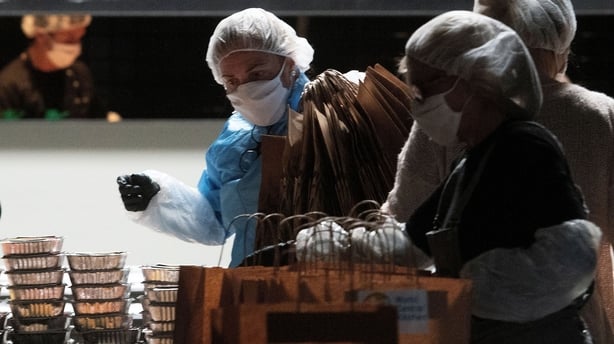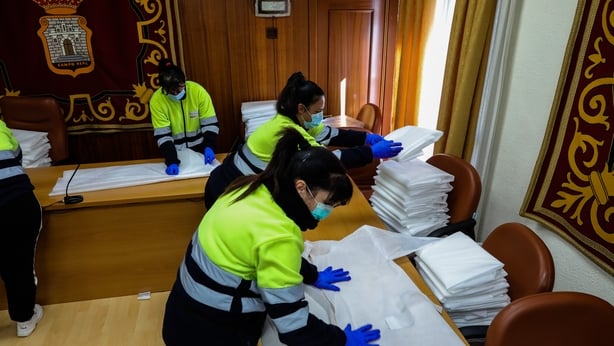The Spanish government said it would use mobile phone location data to track people's movements and see how closely a nationwide lockdown is being respected.
"The goal is to analyse the effect which the (confinement) measures have had on people's movements, and see if people's movements across the land are increasing or decreasing," the government said in a statement.
Dubbed "DataCovid", the study will be carried out by national statistics institute INE with the cooperation of the country's main telecoms operators, it said.
The government said all the data it receives from the operators will be scrubbed of any personally identifiable information and will be completely anonymous, in line with the country's privacy laws.
Spain, a nation of around 47 million residents, imposed a nationwide lockdown on 14 March to fight the coronavirus, with people allowed out only to go to work, buy food, seek medical care and briefly walk their dog.
Restrictions have since been tightened, with non-essential workers asked to stay at home from 30 March.
Earlier, the coronavirus death toll in Spain rose to over 10,000 after a record 950 deaths in 24 hours, the government has said.
Its number of confirmed cases has now passed the 110,000 mark.
Spain has the world's second-highest death toll after Italy, with the virus so far claiming 10,003 lives although the rate of new infections and deaths continued its downward trend, the health ministry figures showed.
It is the third consecutive day of a record amount of people dying since the number dropped slightly on Monday.
The number of cases registered rose by about 8% from yesterday to 110,238, the ministry said.
The proportional daily increases have been slowing down in the past few days.
The total death toll today rose by just over 10%, about the same rate as the previous day.
Over 6,000 people were in intensive care, the data showed.

Jump in people claiming jobless benefits
Meanwhile, Spain registered a leap of 302,265 jobless claims in March, the biggest on record, due to the "extraordinary impact" of the coronavirus pandemic, the labour ministry said.
"This is a historic figure," Labour Minister Yolanda Diaz told a news conference called to discuss the figures.
"We are facing an absolutely exceptional situation," she added.
Spain, the eurozone's fourth-largest economy, imposed a nationwide lockdown on 14 March to fight the coronavirus, with people allowed out only to go to work, buy food, seek medical care and briefly walk their dog.
Restrictions have since been tightened, with non-essential workers in the nation of around 47 million people asked to stay at home from 29 March.
The pandemic "changed the trend" in unemployment figures for March, after only 2,857 workers filled jobless claims in the first 12 days of the month, the ministry said in a statement.
The services sector recorded the most job losses, with 206,016 jobless claims in a country where tourism accounts for around 12% of national output.
Tourism worldwide has been hammered by the pandemic, as governments imposed travel restrictions and airlines grounded scores of flights.
But all sectors of the economy took a hit with nearly 60,000 construction workers filing jobless claims and 6,520 people who work in agriculture.
Meanwhile, the number of unemployed in Spain hit 3.54 million in March, the labour ministry said.
The monthly figure is a different measure from the quarterly unemployment rate, which is based on surveys and stood at 13.8% in the fourth quarter of 2019, according to national statistics institute INE.
That is the second highest jobless rate in the eurozone after Greece.

Pharmacists seek aid
The head of college of pharmacists in the Madrid region, the worst-hit area of Spain, asked the government to supply pharmacy workers with protective gear like face masks in the wake of the death of at least five pharmacists from the virus.
About 270 pharmacists are in quarantine in the region because they have symptoms of the disease, forcing the temporary closure of dozens of pharmacies, Luis Gonzalez said during an interview with private television Telecinco.
"All I ask is that we please be sent medical supplies as soon as possible. We are also health care workers, we are on the front lines of the fight, we are working with the public," he said.
"We are not seeking subsidies, we are not asking for economic aid, we only ask for protective gear...so we can continue providing our service, so no more pharmacies close."
Read more: Latest stories on Covid-19

